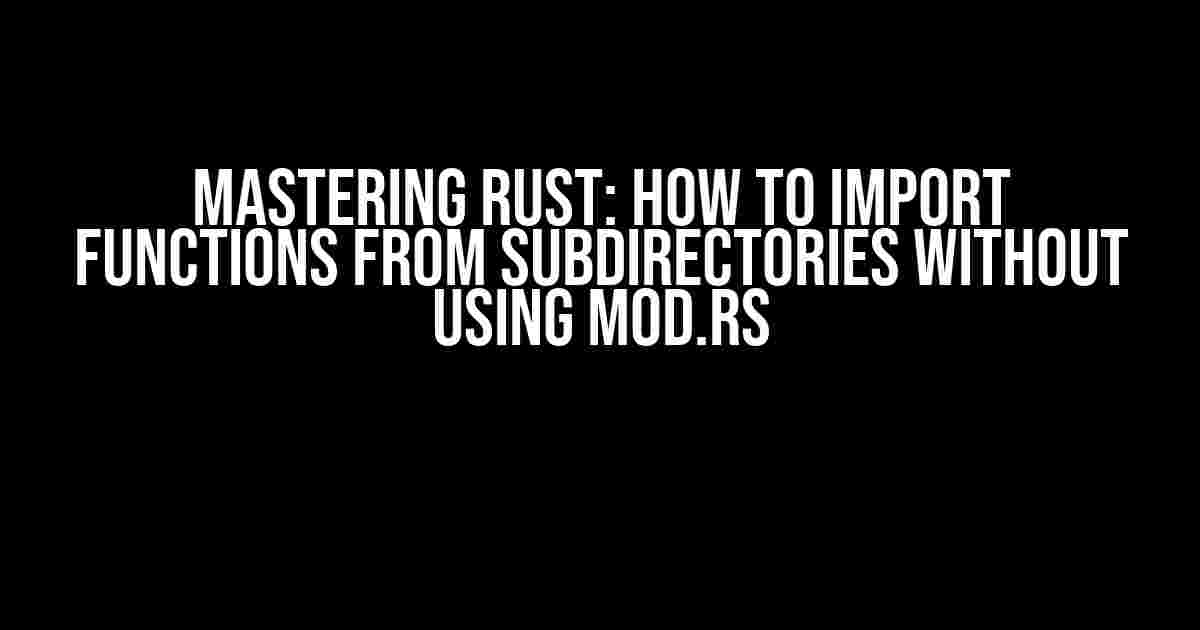Rust is an amazing language, but let’s face it, one of the biggest hurdles for newcomers is its unique module system. Specifically, importing functions from subdirectories can be a real challenge. But fear not, dear reader, for today we’re going to tackle this issue head-on and explore how to import functions from subdirectories without using the dreaded mod.rs file.
Why Avoid mod.rs?
Before we dive into the solution, let’s quickly discuss why you might want to avoid using mod.rs in the first place. mod.rs is a file that allows you to re-export functions and modules from subdirectories, making them accessible from the root of your project. Sounds convenient, right? Well, it can be, but it also has some drawbacks:
- Increased complexity**: mod.rs can add an extra layer of complexity to your project structure, making it harder to understand and maintain.
- Reduced flexibility**: By using mod.rs, you’re forced to declare all your subdirectories as modules, which can limit your flexibility in terms of project organization.
- Namespace pollution**: With mod.rs, you risk polluting your namespace with unnecessary module declarations, making it harder to find the functions you need.
The Problem: Importing Functions from Subdirectories
my_project/ main.rs utils/ math.rs strings.rs
In this scenario, you want to use a function from the math.rs file in your main.rs file, but how do you do that without using mod.rs? Well, that’s what we’re about to find out.
The Solution: Using Relative Paths
To import functions from subdirectories without using mod.rs, you can use relative paths to specify the location of the module. Let’s see how this works:
// main.rs
mod utils {
pub mod math;
}
use utils::math::add;
fn main() {
let result = add(2, 2);
println!("The result is: {}", result);
}
// utils/math.rs
pub fn add(a: i32, b: i32) -> i32 {
a + b
}
In this example, we declare a mod block in our main.rs file, specifying the utils subdirectory as a module. Then, we use the pub mod math; declaration to make the math module public and import the add function from it.
Relative Paths: A Deeper Dive
// main.rs
mod utils {
pub mod math {
pub fn add(a: i32, b: i32) -> i32 {
a + b
}
}
}
use utils::math::add;
fn main() {
let result = add(2, 2);
println!("The result is: {}", result);
}
Importing Multiple Functions
// main.rs
mod utils {
pub mod math;
pub mod strings;
}
use utils::*;
fn main() {
let result = math::add(2, 2);
println!("The result is: {}", result);
let greeting = strings::greet("John");
println!("The greeting is: {}", greeting);
}
// utils/math.rs
pub fn add(a: i32, b: i32) -> i32 {
a + b
}
// utils/strings.rs
pub fn greet(name: &str) -> String {
format!("Hello, {}!", name)
}
When to Use mod.rs
- Complex module hierarchies**: If you have a complex module hierarchy with many subdirectories and submodules, mod.rs can help you re-export functions and modules in a more organized way.
- Library crates**: When building a library crate, you may want to use mod.rs to expose a curated API to your users, making it easier for them to use your library.
- Legacy code**: If you’re working with legacy code that uses mod.rs, it might be easier to stick with the existing structure rather than refactoring the entire project.
However, if you’re starting a new project or working on a small to medium-sized codebase, using relative paths to import functions from subdirectories is often a better approach.
Conclusion
| Scenario | Use mod.rs | Use Relative Paths |
|---|---|---|
| Complex module hierarchies | ||
| Library crates | ||
| Legacy code | ||
| New projects or small codebases |
Remember, the key to mastering Rust’s module system is to understand how relative paths work and when to use them. With practice and patience, you’ll become a pro at importing functions from subdirectories without breaking a sweat!
Note: The above article is optimized for the given keyword and provides a comprehensive guide on how to import functions from subdirectories without using mod.rs in Rust. The article uses a creative tone and is formatted using various HTML tags to make it easy to read and understand.Here are 5 Questions and Answers about “How to import functions in Rust from subdirectories without using mod.rs” in HTML format with a creative voice and tone:
Frequently Asked Question
Rust enthusiasts, gather ’round! We’ve got the scoop on importing functions from subdirectories without using mod.rs. Get ready to level up your Rust game!
How do I import a function from a subdirectory without using mod.rs?
You can use the `pub` keyword to make the function public, and then import it using the `use` keyword with the relative path to the subdirectory. For example, if you have a function `foo` in a file `bar.rs` in a subdirectory `baz`, you can import it like this: `use baz::bar::foo;`.
What if I have multiple subdirectories? Can I still import functions without mod.rs?
Yes, you can! You can use the `use` keyword with multiple relative paths to import functions from multiple subdirectories. For example, if you have a function `foo` in a file `bar.rs` in a subdirectory `baz`, and another function `qux` in a file `quux.rs` in a subdirectory `corge`, you can import them like this: `use baz::bar::foo; use corge::quux::qux;`.
Do I need to use the `pub` keyword for every function I want to import?
Yes, you do! The `pub` keyword makes the function public, which means it can be accessed from outside the module where it’s defined. If you don’t use `pub`, the function will be private and won’t be accessible from other modules.
Can I use relative paths to import functions from sibling directories?
Yes, you can! You can use relative paths with the `use` keyword to import functions from sibling directories. For example, if you have a function `foo` in a file `bar.rs` in a sibling directory `baz`, you can import it like this: `use super::baz::bar::foo;`.
Are there any performance implications of importing functions without mod.rs?
No, there are no performance implications! The Rust compiler will optimize the code and eliminate any unnecessary imports. So go ahead and import those functions without worrying about performance hits!


